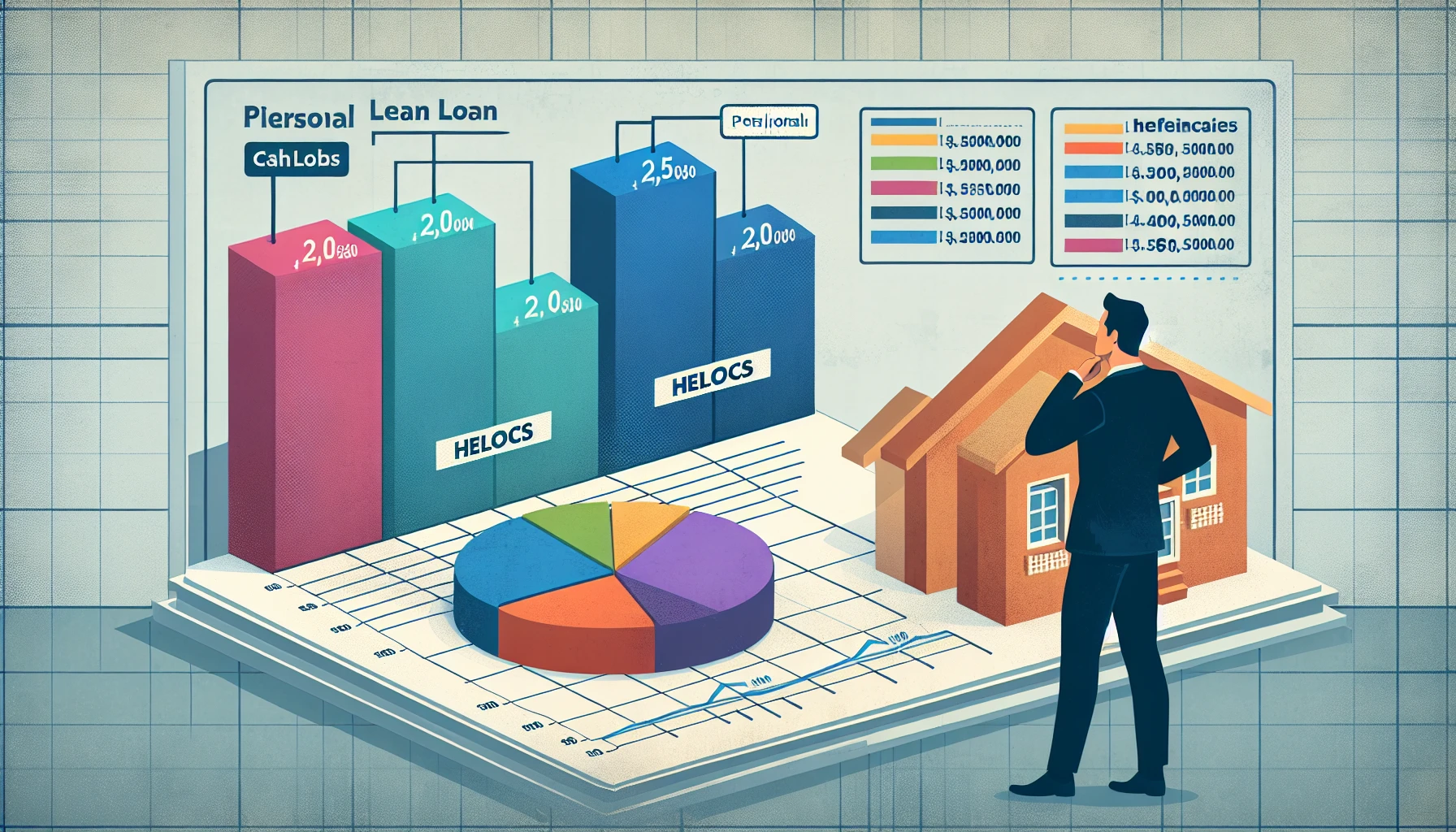Owning a home is often considered a significant achievement and financial milestone. However, many homeowners need to be made aware of how their homes can be a valuable financial resource when faced with unexpected expenses or investment opportunities. Home equity loan pros and cons can be a solution, but it’s essential to have a balanced understanding of their advantages and disadvantages. Let’s dive into the world of home equity loans and uncover the home equity loan pros and cons that can help you make informed decisions.
Key Points
- Home equity loans offer lower borrowing costs, fixed payments, and potential tax benefits.
- Potential drawbacks include the risk of foreclosure, limited flexibility, and associated closing costs/fees.
- Evaluating credit score, debt-to-income ratio & home equity amount is essential before deciding if a home equity loan suits one’s financial needs & goals.
The Advantages of Home Equity Loans

Home equity loans have been growing in popularity, as they offer several benefits that make them attractive financing options. These home equity loan pros include lower borrowing costs, fixed payments, and potential tax advantages, which can help borrowers manage their financial needs more effectively. They tend to be a preferred choice for many homeowners seeking additional funds.
Lower Borrowing Costs
These loans are secured loans, which means they use your home as collateral. This reduces the risk for lenders, allowing them to offer lower interest rates than unsecured loans. The average interest rates for home equity loans usually range between 8% and 10%. Lower interest rates can translate to significant savings over time, making home equity loans a more affordable option for borrowers.
The loan-to-value ratio also influences the interest rates on home equity loans. Generally, a lower loan-to-value ratio, indicating more significant equity in your home, can result in lower interest rates. Borrowers with more substantial home equity can enjoy even lower borrowing costs.
Fixed Payments
One of the appealing aspects of these loans is the fixed payments they offer, similar to mortgage payments. With fixed interest rates and repayment terms, borrowers can enjoy predictable monthly payments throughout the life of the loan. This predictability simplifies budgeting and makes it easier for borrowers to plan their finances.
Home equity loans have the following features:
- Disbursed as a lump-sum payment
- Repaid over a predetermined period, typically ranging from five to 30 years
- Fixed interest rate
- Monthly payments remain constant, providing stability and peace of mind to borrowers.
Tax Benefits
Another advantage of these types of loans is the potential tax benefits. Interest on a home equity loan used for renovations or improvements may be eligible for a tax deduction. The Internal Revenue Service permits deductions on interest related to home loans up to $750,000 for a married couple filing jointly or up to $375,000 for those filing separately. This applies only to qualified home loans.
However, remember that not all interest paid on the loan qualifies for a tax deduction. If the total amount borrowed exceeds the limit or the loan is used for purposes other than home improvements, the interest may not be deductible. Consult a tax professional to determine your eligibility for tax deductions on your loan interest.
The Drawbacks You Need To Know

While home equity loans offer various advantages, they also have some drawbacks that borrowers must consider. These drawbacks include the risk of foreclosure, limited flexibility, and the associated closing costs and fees.
Grasping these downsides aids borrowers in evaluating their choices and making decisions with a better understanding.
Risk of Foreclosure
One of the most significant drawbacks is the risk of foreclosure. Since your home is collateral for the loan, failure to make timely payments or defaulting on the loan can result in losing your home to foreclosure. Foreclosure proceedings on the loan can commence after three consecutive missed payments, putting your home at risk.
If meeting your loan payments becomes a challenge, promptly discussing your situation with your lender and seeking alternatives to avoid foreclosure is necessary. Considering this risk carefully before opting for a home equity loan is essential, as losing your home can have severe financial and emotional consequences.
Limited Flexibility
Another drawback is their limited flexibility. Borrowers who need access to funds on an ongoing basis or plan to move soon may find that these loans are less suitable for their needs. Unlike a home equity line of credit (HELOC), which provides a revolving line of credit, they are disbursed in a lump sum, limiting their adaptability for borrowers with changing financial needs.
Limited flexibility could also burden homeowners planning to move, as it might limit their access to coveted neighborhoods and impede international relocation due to customer demands or security regulations. This drawback should be considered when evaluating the suitability of a home equity loan for your financial situation.
Closing Costs and Fees
They also come with closing costs and fees, ranging from 2% to 5% of the loan amount. These fees may include:
- Document preparation fees
- Attorney fees
- Appraisal fees
- Credit report fees
- Origination fees
- Other miscellaneous fees
These costs can be a financial burden for some borrowers and should be factored into decision-making.
Comparing various lenders and their fees is necessary to find the most economical option for your loan. Be prepared to shop around and negotiate with lenders to minimize your loan’s closing costs and fees.
Comparing Home Equity Loan Alternatives

Examining alternative financing options is necessary before settling on a home equity loan. Some popular alternatives include Home Equity Lines of Credit (HELOCs), personal loans, and cash-out refinances. By comparing these alternatives, you can better understand the pros and cons of each option and make an informed decision based on your financial needs and goals.
Home Equity Line of Credit (HELOC)
A Home Equity Line of Credit (HELOC) offers the following benefits:
- Flexible line of credit with variable interest rates
- Allows borrowers to access funds as needed
- Provides a revolving line of credit that can be tapped into multiple times during the draw period, typically ten years
- During the draw period, borrowers only need to pay interest on the borrowed amount, providing repayment flexibility.
However, remember that HELOCs come with variable interest rates, implying that your monthly payments might change based on market conditions. Also, HELOCs risk losing your home as collateral if you fail to repay the loan.
Personal Loans
Personal loans offer another alternative to these types of loans. They can be secured or unsecured and offer flexibility, making them suitable for various financial needs. However, personal loans typically come with higher interest rates than home equity loans, making them a more expensive option for borrowing. In the case of a personal loan, it’s essential to weigh the pros and cons before making a decision.
One advantage of personal loans is that they do not require collateral, meaning your home is not at risk if you default. This can provide peace of mind for borrowers concerned about the risk of foreclosure associated with home equity loans.
Cash-Out Refinance
A cash-out refinance allows borrowers to access their home equity by replacing their existing mortgage with a larger one. This can provide a lump sum of cash for various financial needs, such as home improvements, debt consolidation, or education expenses. Cash-out refinances can offer lower interest rates and monthly payments than these loans.
However, cash-out refinances may have higher interest rates and fees than traditional home equity loans. Additionally, like home equity loans, cash-out refinances pose the risk of losing your home as collateral if you fail to repay the loan. Be sure to carefully compare each financing option’s pros and cons before deciding.
Factors to Consider

Before opting for this loan, considering different factors that can affect your eligibility and borrowing experience is necessary. These factors include credit score requirements, debt-to-income ratio, and the amount of home equity you have. By evaluating these factors, you can make a more informed decision about whether this loan is the right option for you.
Credit Score Requirements
Credit score requirements for these loans typically start at 680, with the best chances of approval for those with scores above 700. A higher credit score can lead to better loan terms, such as lower interest rates and loan amounts. If your credit score is below 680, obtaining a the loan may be more challenging, and you may face higher interest rates or less favorable loan terms.
Ensure you verify your credit score and strive to enhance it before applying for a home equity loan.
Debt-to-Income Ratio
Debt-to-income ratio is essential for lenders when considering these loans, as it helps determine a borrower’s ability to repay the loan. Lenders typically look for a debt-to-income ratio of 43% or lower, although some may require a lower percentage.
This ratio is calculated by dividing your total monthly debt payments, including your monthly payment for the home equity loan, by your monthly income. Ensure you calculate your debt-to-income ratio and strive to lower it to increase your chances of securing the loan.
Home Equity Amount
The amount of home equity a borrower has will impact the size of the loan they can obtain and may affect interest rates and terms. The minimum home equity required for a home equity loan is typically 20%. If the value of your home decreases, it can result in a reduction in your home equity, which can limit your ability to sell your home for a profit and potentially affect your borrowing options.
Ensure you evaluate your home equity and ponder if a home equity loan is optimal based on your financial condition.
Summary
In conclusion, home equity loans can be a valuable option for homeowners, offering benefits such as lower borrowing costs, fixed payments, and tax advantages. However, they also come with drawbacks, such as the risk of foreclosure, limited flexibility, and closing costs and fees. By comparing home equity loans to alternatives like HELOCs, personal loans, and cash-out refinances and considering factors like credit score requirements, debt-to-income ratio, and home equity amount, borrowers can make informed decisions about whether this loan is the right choice for their financial needs.
Frequently Asked Questions
These loans usually carry higher interest rates than home equity lines of credit and use your home as collateral, meaning a missed payment will negatively affect your credit score.
Taking equity out of your house can provide valuable benefits, such as helping with home improvements or debt consolidation. However, it should only be considered if the financial gain is transparent and beneficial in the long term.
They are not a good option if you’re using them to purchase items like a new car or take a vacation. It should be used for responsible financial decisions such as home improvements, debt consolidation, or other investments that provide long-term returns.
They provide several advantages, such as lower borrowing costs, fixed payments, and tax deductions. These features make them an attractive option for homeowners seeking home equity.
The risk of foreclosure with these loans is significant, as missing payments can lead to the loss of your home.




